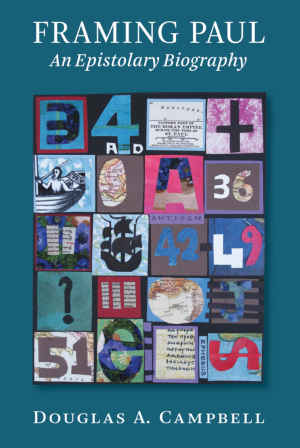How I Learned to Like the Apostle Paul
Baptist minister Andy Goodliff on the teaching (and teacher) which helped him read Paul's letters with new eyes

I wonder if you can remember when you learned to read, when suddenly all the marks of the page suddenly made sense and you found yourself in a new world of stories. Maybe it came very quickly, maybe it was something that took a lot of patience and effort. Apparently for me I was five and with chicken pox, and it began to click. Learning to read changes your life.
I learned to read again when I was 20 years old. It was not that I had forgotten, but I realised that although I could read the words on the page, I was reading them in what you might call flat or narrow ways, that didn’t do justice to what was before me, and it led to a second conversion experience.
I had become a Christian, aged eight, baptized at 14, and then I was converted again aged 20. It not’s that I had stopped being a Christian between 14 and 20, but that my second conversion experience led me into a bigger, more expansive, more astonishing account of the gospel than I had previously encountered or known.
What was this conversion experience? It was beginning to read Paul’s letters with new eyes.
The apostle Paul is a controversial figure. Lots of Christians have a love hate relationship with his letters. We treasure and cling to the likes of Romans 8, and nothing can separate us and 1 Corinthians 13's description of love; but other bits of his letters we find confusing, difficult, and offensive in our modern world. Aged 20 I began to read them all again, like it was for the first time.
 My teacher in this was Douglas Campbell, then lecturer in New Testament at King’s College London, where I was studying. In one term, in unit B226 “Paul Life & Thought”, Paul and his letters came alive to me like never before.
My teacher in this was Douglas Campbell, then lecturer in New Testament at King’s College London, where I was studying. In one term, in unit B226 “Paul Life & Thought”, Paul and his letters came alive to me like never before.
Douglas’s approach to Paul has always been you’ve got to read Paul’s letters alongside Paul’s biography. As you grasp the occasions for Paul’s letter writing, suddenly the content begins to make sense.
Douglas introduced me to the work of J. Lou Martyn and J. Christiaan Beker, two scholars who led the way in seeing Paul as an apocalyptic theologian, by which it is meant a theologian who believed his life, and more importantly the whole of creation, had been transformed by God’s revelation – his apocalypse – in Jesus Christ. Everything in Paul’s theology begins and ends and goes through Jesus Christ.
While at King’s Douglas Campbell was working on what became a very big book: The Deliverance of God. It was eventually finished after he moved to Duke University, North Carolina and published in 2009.
Here Campbell argued that we had been reading Paul wrong. We had focused too much on what was termed a justification by faith reading of Paul, based on a small set of passages in Galatians, Philippians and most prominently in Romans where Paul talks the language of justification by faith.
We had created the equivalent of a huge edifice from these texts, which Campbell’s book carefully sought to tear down, and instead suggest we need to build elsewhere if we want to understand Paul’s account of the gospel. In simple terms, Campbell suggests we look more at Romans 5-8, than Romans 1-4. His thesis was a bold one, offering a fresh re-reading of Paul’s intention in Romans 1-4.
 This was followed in 2014 by a book slightly shorter in length called Framing Paul. Here Campbell constructed the biography of Paul’s life from his letters, something he had been working on for the last two decades. A clearer sense of the letters could be gained when we read them in the right order and against what was going on in Paul’s life.
This was followed in 2014 by a book slightly shorter in length called Framing Paul. Here Campbell constructed the biography of Paul’s life from his letters, something he had been working on for the last two decades. A clearer sense of the letters could be gained when we read them in the right order and against what was going on in Paul’s life.
Too few scholars bother with this kind of biographical work, assuming that Paul’s letters can simply be fitted in around the narrative we have in the book of Acts. Campbell says we need to do it in reverse: begin with the letters, then look at Acts.
On Campbell’s reading the first letters of Paul are 1 and 2 Thessalonians, written in the early 40s AD. The rest of his letters (that we have) then appeared in 50-52 AD, following first an agreement in Jerusalem about Paul’s law free gospel (so Ephesians and Colossians), which is then second challenged by a group of Jewish-Christians dissenters who turn up in Galatia (so Galatians), and then are probably heading to Rome (so Romans). The Corinthian correspondence was written in between, dealing with the problematic congregation there.
Earlier this year Douglas published his most recent book Paul: An Apostle’s Journey. Here he presents a very readable and accessible account of Paul’s life and Paul’s account of the Christian life. We journey with Paul from his conversion through his missionary journeys reflecting on the way his approach to evangelism, church, ethics and more.
Through Douglas’s work I have come to see that Paul saw the Christian gospel as much more astonishing and mind-blowing than it is often presented. Too often we reduce being Christian to just believing a few different things and trying to be a good person; whereas in Jesus, says Paul, God has rescued, liberated, and established a new creation and by his Spirit God is transforming lives – freeing them – and this is to leave one world behind to live in the basis of the new.
This was the gospel I was converted to when I was 20. This was how I learned to read again.
Working today there are some exciting and helpful readers of the apostle Paul. For many Tom Wright has cornered the market, or at least swamped it. In writing this little piece I’ve wanted to suggest that there are others who are writing and teaching who go further than Wright.
So order yourself a copy of Paul: An Apostle’s Journey by Douglas Campbell, and as you do, look for the work of Beverly Gaventa, especially her little book When in Romans, and also John Barclay and his little books Paul: A Very Brief History and Paul and the Subversive Power of Grace.
Maybe you’ll have a second conversion experience like I did.
Apostle Paul image | Bartolomeo Montagna - Saint Paul - Google Art Project | Wikimedia Commons
The Revd Andy Goodliff is minister of Belle Vue Baptist Church, Southend-on-Sea
Related: Douglas Campbell on Paul, Apocalyptic, Prison, Biography his new book - Andy interviews Douglas on his blog
What was the book or who was the teacher that made you see things in a new way? Share your thoughts via our letters' page.
Baptist Times, 20/06/2018